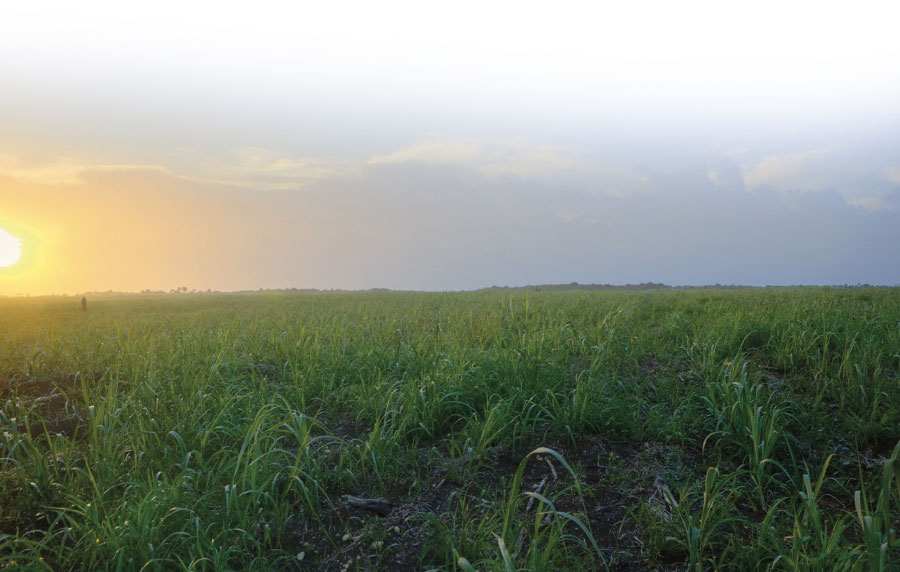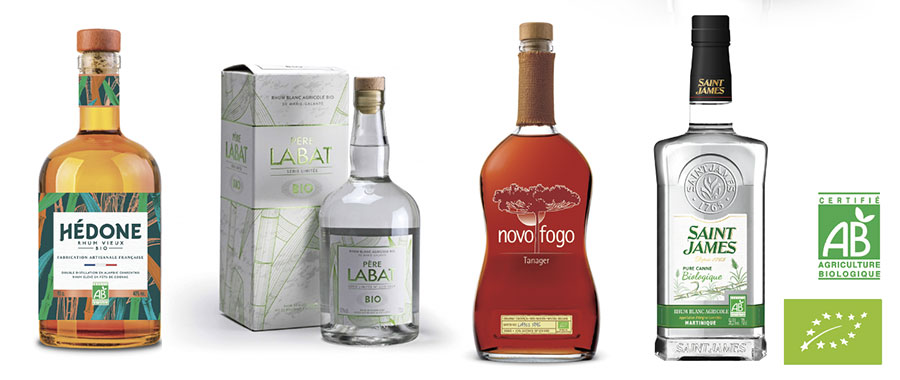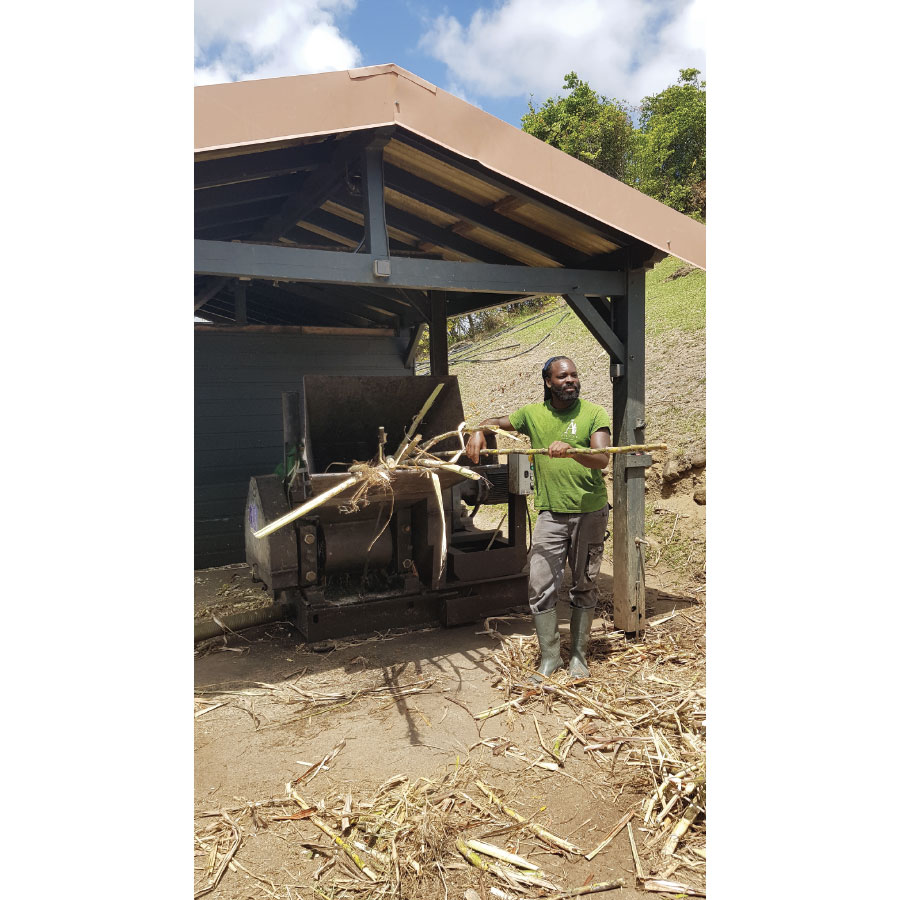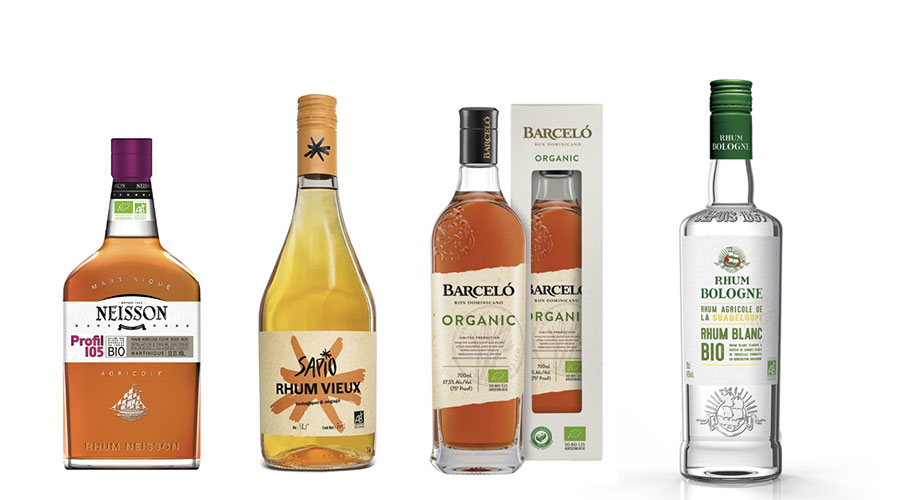While organic winegrowing in France is a great success, with 15% of its vineyards obtaining certification and winning over wine lovers, until a few years ago organic rum seemed to be lagging behind. However, the success of the pioneering Neisson and a real desire on the part of distilleries to protect the environment have recently given rise to numerous organic vintages. A small wave for the moment… but one that probably foreshadows the future of French rums.
Is organic the ultimate horizon for rums from the West Indies, and more widely for French rums? The question may seem a little provocative, or even the product of a Parisian bobo’s monomania… and yet it is fair to ask it when you see the flowering of organic vintages in recent years.
Almost all the distilleries in the French West Indies have switched over to organic farming, or are in the process of doing so. Of course we can mention the precursor Neisson, but also Saint-James, A1710, Depaz… In Guadeloupe, Bologne, Père Labat, Longueteau… In Reunion, Isautier (see our box)… In French Polynesia, Manao, Manutea… In France, O’Baptiste, Vivants… At independent bottlers La Maison du Rhum, Tres Hombres… Outside our borders Barcelo (Dominican Republic) or cachaças such as Abelha, Novo Fuego (Brazil)…
And that’s without counting all the grogues (Cape Verde) and clairins (Haiti), which without having an organic label do not use pesticides when they cultivate the sugar cane In short, let’s stop the inventory, which will no longer be up to date by the time the magazine is published, given the frantic pace of new organic wine releases.
3 years of transition
But in fact, what are we talking about when we brandish the organic label? According to European legislation (dating from 2009), a product is organic if it has been produced without the use of synthetic pesticides and/or with organic ingredients.
Applied to rum, this means that the sugar cane (whether the juice is fermented and then distilled, or transformed into molasses), must have been cultivated without any phytosanitary products. The other ingredients that may be used in its composition (yeast, caramel, sweetener, etc.) must also be certified organic.
The certification of an organic plot of land is not an easy task because it takes three years, during which sugar cane that is used to being treated with pesticides must suddenly do without. If no pesticides are used during this period, the certifying body (e.g. Ecocert) will award the label, which the rum producer can display on his bottles, either with the AB (organic farming) label, or with the green European leaf, or both.
Doing without herbicides
In the West Indies (as well as in Reunion and Polynesia), the undertaking is both easier and more complicated than it seems. Few, if any, fungicides and insecticides are used there. Rum producers rely either on the natural resistance of the sugar cane or on non-chemical methods to combat insects and fungi.
There is still the question of ‘weeds’, i.e. plants that will compete with the sugarcane when it grows, and capture either its water or its sunlight, or both.
But this is precisely where the problem lies, because in regions where there are no cold winters and where temperatures are high, vegetation grows all year round at great speed. Rum producers wishing to go organic must therefore put in place strategies to replace the herbicides that usually kill the unwanted weeds but leave the cane intact.
Most often, this weeding has to be done manually, or with hand-held sugar cane cutters, which means that they have to call on extra labour. This means that they have to call on extra labour, which is difficult to find because the work in the sugarcane fields is physically very hard. More labour also means more costs, and therefore more expensive rum to produce.
In addition, all the producers who have gone organic have noticed a drop in yields in the early days…. Fortunately, this trend can be reversed over the years. Others, like A1710 in Martinique, did not have to think about yields, or about the use of synthetic pesticides, since the fields were worked organically from the very beginning of the distillery.
Because when we talk about organic, we are talking about the land and nature, and also about health. Indeed, there is no such thing as an organic taste. There is no study proving that an organic rum is better than a conventional rum. Moreover, although it is a commercial argument, organic is far from being unstoppable. When interviewed, three of the main Parisian rum merchants, Christian de Montaguère, Freddy Lucina (A’Rhum), and Alexandre Beudet (Excellence Rhum), almost never see customers coming to them who specifically ask for organic rums. According to Thomas Gauthier of the French Spirits Federation, organic rum is growing, but at a much slower rate than the rest of the rum market (+0.4%), and it represents 1% of the category.
So, even if producing an organic rum allows you to be referenced in organic shops and chains (Naturalia, La Vie Claire…), this is not a sales guarantee. Finally, organic rums cost more to produce and are therefore sold at a higher price in shops, which can dampen the spirits of potential customers. Rum lovers do not yet seem to be ready to bet on organic rum, and we are still far from the situation of wine in France, where wine shops full of organic, biodynamic or ‘natural’ wines are constantly springing up, to the great satisfaction of customers.
Protecting the environment and health
If organic is so important, it is to protect nature. Numerous scientific studies (contested by the producers of phytosanitary products) show that synthetic pesticides kill biodiversity and pollute soils and waterways in the long term. Organic is also better for your health. Not for the health of rum lovers, since the pesticides used in the fields are not found in the rum after distillation, or only in minute quantities…
but for the health of the workers who spray them, or for the health of people living in or simply passing by the treated fields. Here, we must make a diversion to France and the wine industry, where many associations are fighting against the spraying of pesticides near homes or even schools.
Or to better protect winegrowers and employees of winegrowing estates, who are supposed to wear individual protective equipment (gloves, goggles, protective clothing, boots, masks and respiratory protection devices, etc.). In these overseas regions, which have been particularly affected by the chlordecone tragedy, these arguments are bound to hit home. And most rum producers who switch their plots to organic farming are not doing so for the sake of taste or money, but to protect their land…
A drop of water in the rum
Although many organic vintages are being released at the moment, the number of plots that are actually organic is still very small and represents a tiny part of the sugar cane fields in the West Indies. If we add up the parcels in conversion of Neisson, Bologne, Père Labat, Saint-James… or those in conversion (Longueteau, Depaz…), we reach perhaps 50 hectares, a drop in the ocean when we know that 4,000 hectares are currently cultivated in Martinique alone.
By way of comparison, the Barcelo brand alone can count on 150 hectares of organic production… Rum from the West Indies still has a long way to go to reach the level of French winegrowing, for example, with its 15% of vineyards that can boast the famous label.
The horizon of luxury
Finally, can we say that organic is the future of West Indian rum? Despite the obstacles (higher production costs, lower yields, increased payroll, etc.), it probably is. Firstly, because most distilleries are already well advanced in reducing the use of pesticides and preserving the environment as a whole (virtuous agricultural practices, energy production via bagasse, reprocessing of vinasses, etc.) and because the authorities are constantly banning the use of chemical weed killers by producers (Asulox, for example).
It is therefore almost natural that distilleries are being pushed towards organic production, without making it an end in itself and without limiting themselves to this label (they are also looking for HVE, Bonsucro, ISO 14001…). On the question of sustainable development and CSR, French rum distilleries are ahead of the French wine industry.
Secondly, because the brands from the West Indies, due to their brand image, the quality of their products, their unique know-how, their high production costs… are destined in the short or medium term to become luxury or at least ultra-premium brands. A world where they will have to show their true colours, or rather their green colours.




